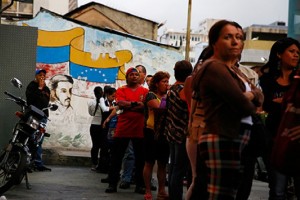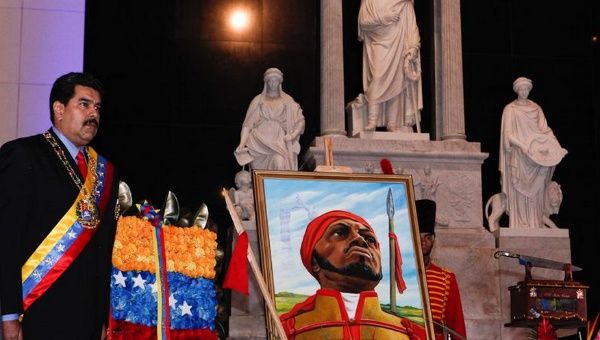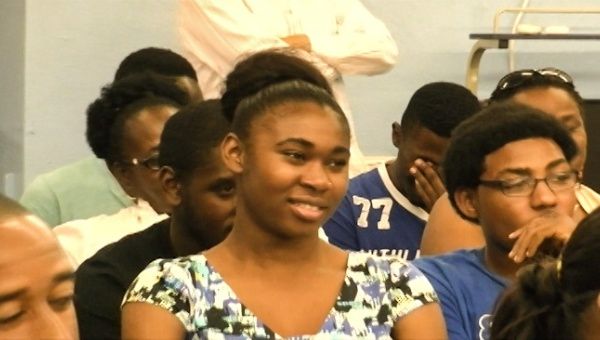Afro-Latinas Work for Cultural Survival 0+
In recent years, there has been a resurgence of Afro-Latino youth in the U.S. rooting themselves, their families and their communities in their African heritages as a way to create cultures of resistance to the dominant narratives of colonization and white supremacy.
These movements have been for the most part led by Afro-Latina women who live within the intersections of oppression, gender, class, race, and immigration. They take inspiration from the past, as well as the future. And they work to co-create cultures that can fight against the overwhelming tide of erasure of their own African diasporic existences.The work of embracing Afro-Latino identity is a work for cultural survival and connection.
The U.S. Census Bureau reported that in 2010, 2.5 percent of the 54 million Latinos living in the United States co-identified as black. Many Latinos say that number is a significant undercount. Nicholas Jones, chief of the Bureau's Racial Statistics Branch said, “I believe that what we’re hearing from the Afro-Latino community is that they do not believe that those numbers accurately illustrate the Afro-Latino community presence in the United States, and that’s the dialogue that we’re having.”
In the same census, over half of Latinos also identified themselves as white and 36 percent marked themselves as “some other race.”
“The social and economic situation in countries such as Peru, Colombia, Ecuador, Brazil and Honduras shows that Afrodescendant women are the poorest of the poor. In fact, most Afro-Latinas live below the poverty line,” wrote Leonardo Reales Jimenez, a historian and coordinator of the Afro-Colombian National Movement, a year ago on various websites . “This situation suggests that there is a socio-political context in which Afro-Latinas suffer permanent violations of their rights, although many public and private institutions in the region tend to disregard the existence of problems affecting Afrodescendant women.”
(Photo: latinosusa.org)
According to the U.N., there are about 150 million Afro-Latinos in Latin America, representing between 20 and 30 percent of the region’s population. The countries with the most Afro-Latinos include Brazil, Haiti, Dominican Republic, Cuba, and Colombia.
Nathalie Tejada, the founder of TINGO Grita Fuerte, an organization dedicated to the “cultural, spiritual and human rights … for Afro womyn,” said in an interview with teleSUR that TINGO is named after Mama Tingo, a woman “revered in her native Dominican Republic for her heroic fight for the rights of the country’s peasantry to their lands.”
Mama Tingo organized her community against those who were attempting to take land away from the poor farmers, because the farmers did not have legal documents proving they were owners of the land that sustained themselves and their families.
For Tejada, Mama Tingo represents a warrior who was black, a woman and poor, and who stands as a source of inspiration for people who find themselves similarly standing in the crosshairs of gender, class and racial oppression. TINGO Grita Fuerte organizes Afrodescendant women through workshops, cultural events, and festivals in New York City.
Tejada explained, “In Latin America, we don't use the word black. Black can be very negative and very positive. We use Afrodescendant, because it allows (women) to embrace who they are … In Latin America, we often ignore Africa.” Latinos, she said, are much likely to embrace their indigenous roots than their African ones.
She also said that the images that Latin American media projects to itself and to the world are often racially skewed and biased visions of the Latin American communities. “African descended women ... we don't understand the term. We just carry the (physical) features … the media doesn't represent us. We are “whore,” we are in the kitchen, in telenovelas … but, (we) want to be queen. But, how do you have to be, how do you have to look...?” She pointed out that even in Latin America, people don't know that their own nation-states have African-descended communities. “That is not what we see in the media,” said Tejada.
In the Latino communities, the Dominican Republic is often held up as the purveyor of anti-black racism. Tejada said that people say, “Oh .. the Dominican Republic, that they are racist. But when you see the situation in Colombia, Mexico ... we can see the same (anti-black) views in these countries. In Latin America we like to scapegoat the Dominican Republic.”
Aurora Ellis, a journalist and scholar on African communities, made the connection between anti-blackness and community self-destruction in an interview with teleSUR.
“Anti-blackness is very destructive to latin communities because like all forms of discrimination it keeps our countries economically depressed by neglecting the development of key populations that in many cases make up a significant portion of the overall population,” she said.
Not only does anti-Blackness hurt Afro-Latinos and Latino communities, it also feeds into a white supremacist anti-immigration narrative. “Globally, anti-immigration narratives are often bolstered and supported by fears of ‘darkening’ the Western population, which are connected to anti-black/color tropes. Perpetuating anti-blackness in latino communities therefore undermines our struggle for just immigration and refugee laws,” Ellis added.
Like Tejada, Ellis sees one of the primary steps of combatting anti-blackness in Latino communities is celebrating Afrodescendant peoples and culture in the media and intra-community conversations about the perniciousness of anti-blackness.
“Latinos need to appreciate their own specific blackness and heritage,” said Ellis. “This includes visible and affirming representations of diverse Afro-Latinos, drawing parallels between our history/contemporary situation and diverse black movements, and even coming together to openly discuss our problems with anti-blackness (our perceptions of cabello malo and skin tone etc.) something that is not really encouraged in Latin American countries.”
Tejada added, “The way that we are living, it is controlled by white supremacy. It only believes in mass production.”
Grita Fuerte (Photo: Tingo / J.Giuchado)
She continued by saying that white supremacy teaches us that the only way someone can succeed is to be individualistic, to be isolated, to only take care of yourself. However, she countered, “It’s not how I am going to grow, or how my group is going to grow, it’s how we all are going to grow … The capitalist ethos, leaves you alone, and disconnected.”
In the essay, “The Black women in resistance,” Charo Mina Rojas, Marilyn Machado, Patricia Botero and Arturo Escobar, write, “Women have been central in the process of community building, in sustainable ways and in solidarity with life, reproduction of cultural practices and the protection of life and land.
“From slavery, passing through the process of economic transformation of the country, Afrodescendant women have been tied to the processes of capitalist production, in conditions of subordination and invisibility … However, they have developed actions of resistance. The blood of many women is found in the land that they have defended in order to leave hope in a life with dignity to their descendants.”
Tejada concurred, saying, “It’s people who have the power to build and create. Then people can create a legacy, leave a legacy. We are so isolated, that we cannot build, we cannot carry a legacy.”
This content was originally published by teleSUR at the following address:
"http://www.telesurtv.net/english/analysis/Afro-Latinas-Work-for-Cultural-Survival-20150317-0022.html". If you intend to use it, please cite the source and provide a link to the original article.
www.teleSURtv.net/english

 . Maybe they can go to Bonaire, they got space
. Maybe they can go to Bonaire, they got space 












